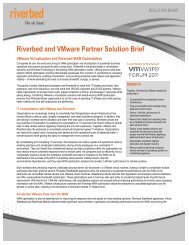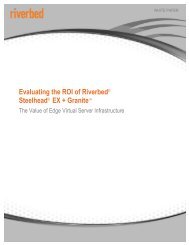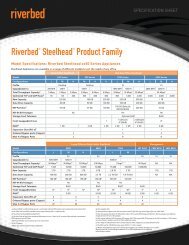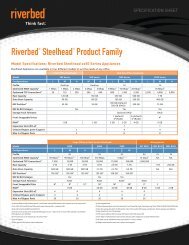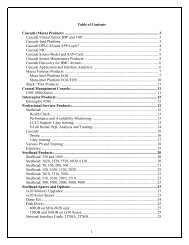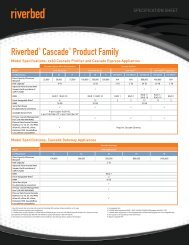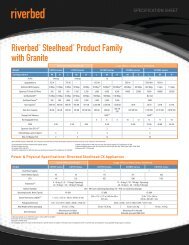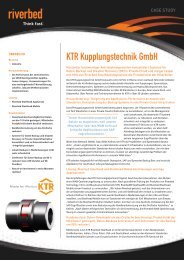Riverbed Optimization System (RiOS) 6.1
Riverbed Optimization System (RiOS) 6.1
Riverbed Optimization System (RiOS) 6.1
You also want an ePaper? Increase the reach of your titles
YUMPU automatically turns print PDFs into web optimized ePapers that Google loves.
<strong>RiOS</strong> Technical Overview<br />
Application-independent Foundation<br />
With <strong>RiOS</strong>, all TCP traffic, regardless of the application that generated it, can be intercepted and accelerated. <strong>Riverbed</strong>’s data<br />
streamlining algorithms remove redundancy from that traffic to reduce bandwidth utilization. Data streamlining is not limited to a<br />
“silo” of a particular application, but can apply optimizations across all application traffic. In addition, transport streamlining<br />
optimizes the behavior of TCP on the WAN. And with <strong>RiOS</strong>, both data streamlining and transport streamlining can be applied to<br />
SSL-encrypted data as well as data in the clear.<br />
Contrast this to other approaches, such as caching, that require knowledge of the application protocol in order to perform data<br />
reduction optimizations. These approaches are limited in what applications they can support and generally cannot optimize<br />
transfers based on previous data from other applications.<br />
Additional Application-specific <strong>Optimization</strong>s<br />
For many widely-used applications like Windows file sharing or Exchange email, the application protocols are often the limiting<br />
factors to performance across the WAN. In order to have an even greater impact on these applications’ performance over the<br />
WAN, optimizations must be made to the application protocol itself. <strong>Riverbed</strong> delivers this capability by including additional<br />
application streamlining modules in the architecture. Application Streamlining enables <strong>RiOS</strong> to address application-specific<br />
bottlenecks in addition to the underlying data streamlining and transport streamlining optimizations. Application streamlining allows<br />
<strong>Riverbed</strong> to deliver and improve those optimizations incrementally, without any architectural changes. Approaches such as TCP<br />
optimizers or data compression devices have tried to include such application-specific optimizations, but have shown limited<br />
performance gains because the system was not designed to support application-independent as well as application-specific<br />
optimizations. With <strong>RiOS</strong>, all applications benefit from the application-agnostic foundation, and the applications that enterprises<br />
care about the most further benefit from application-specific optimizations.<br />
Universal Data Store<br />
Building on top of its disk-based architecture, <strong>RiOS</strong>’ universal data store allows the data reduction process to efficiently scale<br />
across multiple peers. By avoiding the inherent scalability and performance limitations of per-peer data stores, organizations can<br />
save costs on appliance storage and leverage the data reduction benefits of multiple peers feeding a universal store.<br />
Figure-7: Universal Data Store maximizes storage peering efficiency to achieve higher scalability.<br />
© 2010 <strong>Riverbed</strong> Technology. All rights reserved. 7




